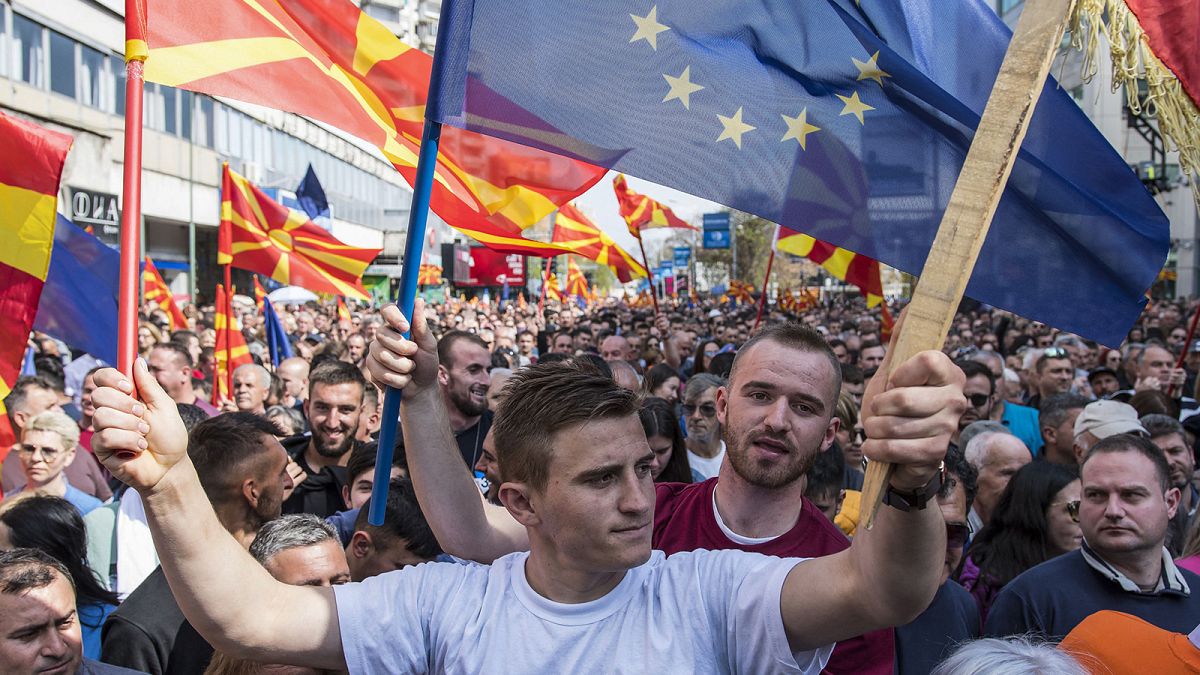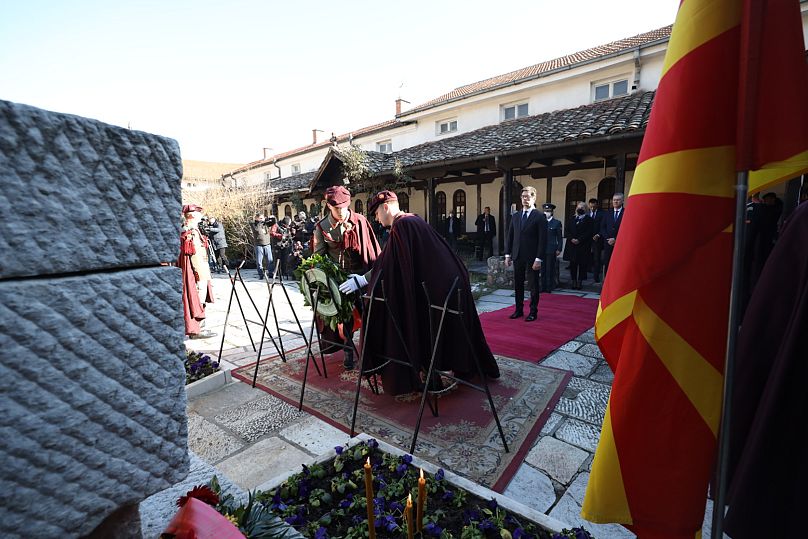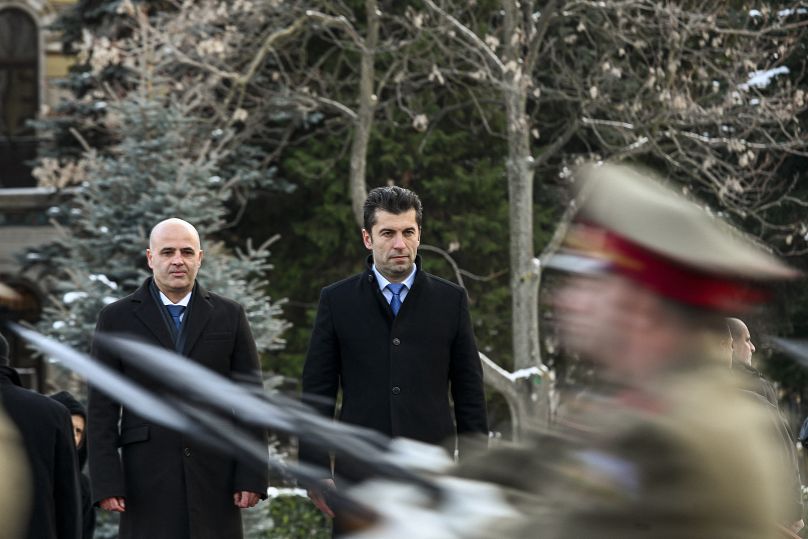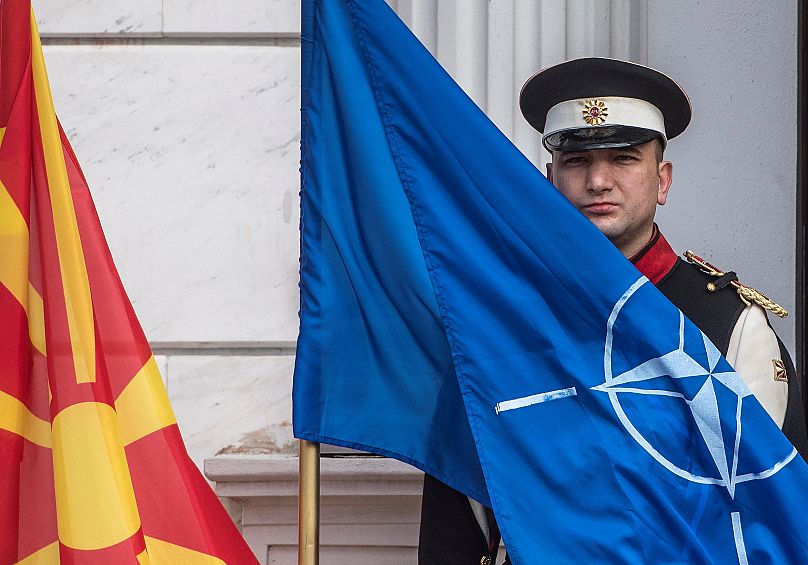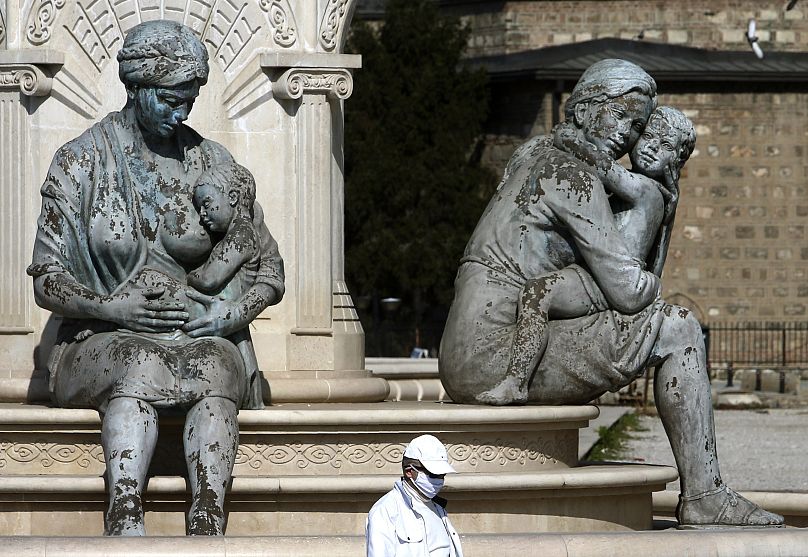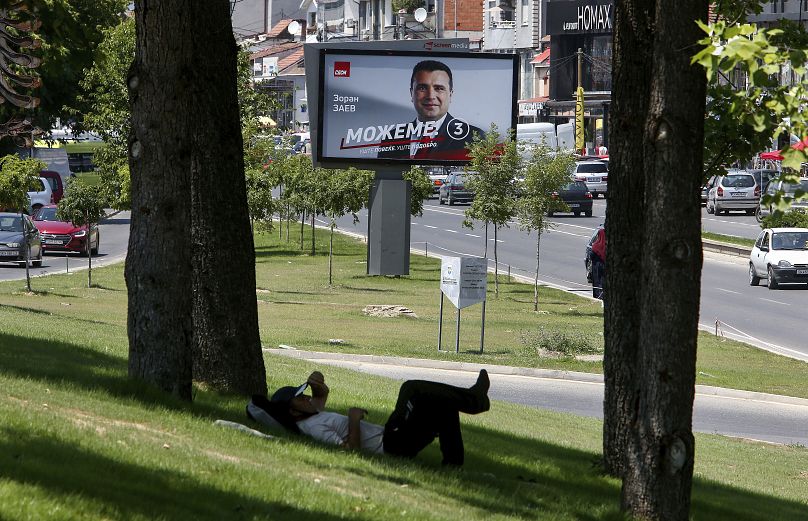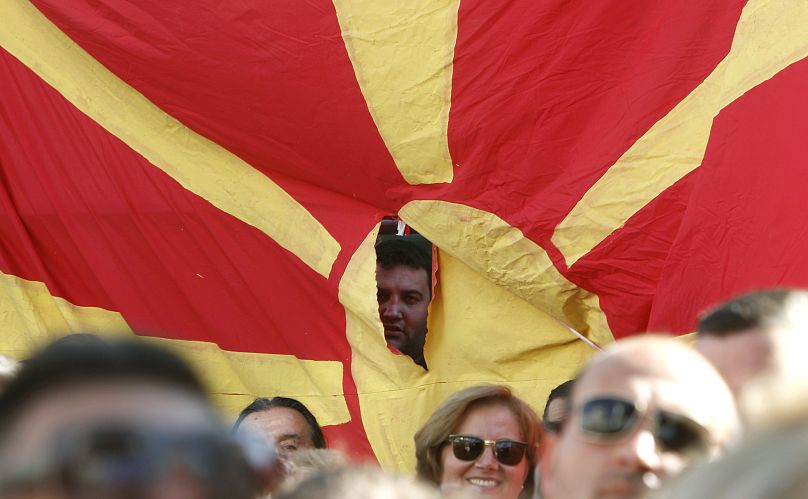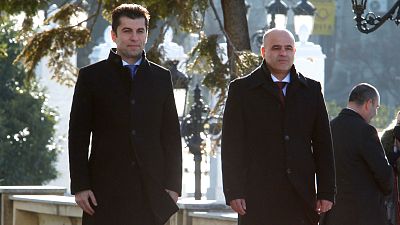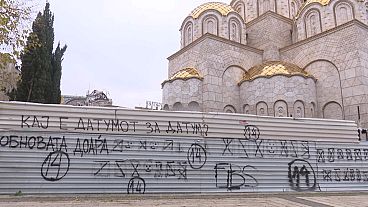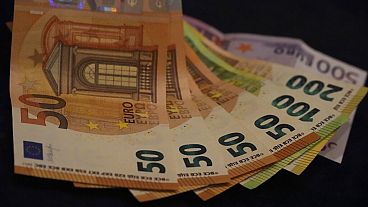Can new governments resolve centuries-old issues plaguing North Macedonia and Bulgaria?
Both countries have pledged to resolve the impasse brought on by the Bulgarian veto to North Macedonia's EU membership negotiations. But are nationalists going to cause further roadblocks?
The debate over Macedonian identity that led to Bulgaria vetoing its neighbour’s EU accession has entered its third year.
A new government in Bulgaria, after a protracted political crisis that saw the country hold two failed elections amid months of protest, could signal a fresh perspective on a debate that, at its core, involves historical events from many centuries past.
North Macedonia's launch of membership talks with the union requires full consensus by all 27 member states, and Bulgaria is using the most significant power given to member states — that of vetoing a candidate’s accession — by sticking to its demands for a number of concessions on Macedonian language and historical figures being, in fact, Bulgarian.
Yet, Macedonian President Stevo Pendarovski still struggles to justify why events that took place in the distant past have such a disproportionate effect on the fate of his citizens today.
“I cannot explain to the average Macedonian voter or citizen how it’s important for entering the EU — an organisation established in 1957, in the 20th century — what ethnicity Goce Delchev was or some other foundational hero, like Tsar Samuel ten centuries ago,” he told Euronews.
Goce (or Gotse) Delchev was a 19th-century revolutionary who fought for the rights of the Slavic populations that lived on the territories of today’s Bulgaria, North Macedonia and parts of Greece.
While Bulgaria considers him a hero, for North Macedonia he is the central figure of the country’s struggle for independence and national self-determination.
Trying to pin down how he defined himself during his lifetime is a thankless exercise in historical extrapolation.
Two Balkan Wars and two World Wars, and the transitions from monarchies to communism, and finally, liberal democracies all occurred between his death and today, not to even mention several waves of massive migration and population exchanges in the territories he operated in.
Whose Delchev is it, anyway?
Yet today, the seemingly innocuous celebration of his birthday on February 4 led to protests in both Skopje and Sofia.
In the Bulgarian capital, it was the members of the VMRO-BNM — a right-wing nationalist party named after Delchev’s revolutionary organisation — who appeared in front of the presidency, carrying a “Macedonia is Bulgarian” banner.
The party’s leader Krassimir Karakachanov promised “it would rain stones” if the Bulgarian government makes any concessions on its EU membership veto against North Macedonia. VMRO-BNM claim to be Delchev’s political descendants.
Videos appeared on social media showing a group of citizens shouting “In the past and now, Macedonia is Bulgarian” in downtown Sofia later that evening.
In Skopje, Komiti, a fans' group from local football club Vardar, were at first banned from entering the Church of the Ascension of Jesus — where Delchev’s remains are interred — for fear of causing a nationalist incident.
The group was later allowed to lay a wreath at Delchev’s grave, accompanied by police in large numbers.
The new Bulgarian Prime Minister Kiril Petkov and his Macedonian counterpart Dimitar Kovachevski have so far sent mixed messages during their attempts to bridge the gap between the two countries in the run-up to Delchev’s anniversary.
Although the two announced that a joint celebration was in the works — which many took as a sign that Petkov will make yet another visit to Skopje — Petkov instead opted to go to the Bulgarian town of Blagoevgrad, or Delchev’s birthplace, in the company of President Rumen Radev.
Kovachevski went to Brussels.
“Bulgarian revolutionary Goce Delchev is an inseparable part of our joint history with the people of North Macedonia. He is one of those figures that two peoples are proud of,” Petkov said in a brief statement on the Bulgarian government’s Facebook page.
Even the two former PMs, North Macedonia’s Zoran Zaev and Bulgaria’s Boyko Borissov managed to get together for Delchev, laying wreaths on his grave on 4 January in 2017 and 2019.
The latest bilateral cold shoulder over commemorating Delchev is in contrast to the overall warming of relations between the two that Petkov showcased during his visit to Skopje on 18 January, a mere month after he took office and two days after North Macedonia’s parliament approved Kovachevski’s cabinet.
Petkov agreed on a six-month negotiations format that would involve five intergovernmental workgroups — on the economy, infrastructure, EU integration, history and culture. A plan that would, with Macedonian concessions, break the deadlock once and for all.
This drew sharp criticism from domestic actors in Bulgaria, including President Radev himself. Radev, a former Bulgarian Army major general turned right-wing populist who ran as an independent candidate, has been at odds with Petkov, a liberal centrist touted for his Harvard degree almost since his first day in office.
The two have publicly sparred over everything ranging from pandemic management to the budget deficit.
After making a series of demands — such as asking that the Bulgarian minority be included in North Macedonia’s constitution as a condition for lifting the veto — Radev openly told Petkov not to set deadlines to talks or make any concessions until the government in Skopje fulfils all of Bulgaria’s requirements, labelling his January visit as “hasty”.
Petkov responded by saying that his trip to Skopje was in fact “terribly late”.
“It was late for the Bulgarian side to have an active position, to have a constructive tone of action, to have clear goals and a precise approach,” he told Bulgarian channel bTV.
“I believe that if we don’t want the Balkans to remain the poorest, the most corrupt, the most uncoordinated place in the EU, the approach must be changed.”
“This should be based on good neighbourliness, economic development, working together,” Petkov stated, adding, “It's like a house: you can't argue with your neighbour and think it's a good idea.”
EU's image takes a hit
And although the Macedonian president still believes that Petkov and Kovachevski can solve the impasse, as “young people coming outside of the political mainstream [who] speak a different language”, he is worried that the EU’s role as a problem-solver in the dispute might have taken a hit.
“I can tell you that the drop in North Macedonia is bigger than anywhere in any other country of Western Balkans,” Pendarovski said. “If you look at the polls, we are down by 20 or 25% since we had the referendum on changing our name.”
North Macedonia has already jumped significant hurdles to show its commitment to joining the union.
Having achieved full statehood in 1991 only after the breakup of Yugoslavia, it arrived late to the nation-building party and first had to deal with its southern neighbour Greece, who vetoed the use of the name “Macedonia” for the country — claiming they had a region by the same name.
Resolving the name dispute took 11 years. This despite North Macedonia being deemed a regional frontrunner when it applied for EU membership in 2004.
In 2018, the Republic of Macedonia agreed to go as far as to change its name to North Macedonia and signed the Prespa Agreement with Greece to much praise.
“The question on the referendum was, ‘Would you like your country to change its name in order to enter NATO and start negotiations with the EU?’ And an overwhelming majority of the people, 91% of those who voted on that day said yes,” Pendarovski recalled.
“Now we have seen nothing of the EU. Why? Because one member state — only one member state out of 27 is saying we should discuss history. Come on.”
No sooner was the Greece problem solved, the issues with Bulgaria emerged. But Bulgaria and North Macedonia were not always at loggerheads. In fact, Bulgaria along with Turkey were the first countries to recognise North Macedonia’s independence in 1991.
It was also Bulgaria that kept the door to NATO membership open for North Macedonia during the Greek veto.
The 2017 bilateral treaty on good-neighbourly relations, signed by PMs Zaev and Borissov, was seen as the defining moment in the ever-growing positive attitudes between the two, Pendarovski recalled.
“And after that, all of a sudden — I’m still not aware what the main motive was behind that — they started speaking about history, about history being a precondition for progressing towards Brussels, and I can tell you that all of us on this end of this political divide, or discussion if you like, were caught off-guard.”
“Even today, I’m really not sure about the real motives on their side, why history was so important for them. That never happened to any other candidate for EU membership,” Pendarovski said.
Everyone wants a piece of North Macedonia
Bulgarian former Deputy Foreign Minister Lyubomir Kyuchukov says that the treaty on good neighbourly relations between the two (which he worked on) was the opposite of the Prespa Agreement.
“They have different aims, different tasks,” Kyuchukov told Euronews. “The Greeks tried to prove that the current Macedonian state has nothing to do with Greek history. We’re trying to prove that everything is in common.”
“For us, the signing of the treaty was the beginning of finding a solution to the problem, because it is a process, not a matter of an act. And that’s why our treaty is not so popular in Bulgaria,” he said.
Sofia saw the treaty as an opportunity to get a number of concessions from Skopje, including acknowledging the former’s claims that the Macedonian language and ethnic group are derived from the Bulgarian one.
Although today’s Bulgaria and North Macedonia gained independence from the Ottoman Empire at the same time, the decisions made at the Berlin Congress in 1878 saw a significant part of Macedonian territory return to the Ottomans.
The Kresna-Razlog or Macedonian Uprising of the same year, which sought to re-unify the territory before it ended up being crushed by the Ottoman army, is a major point of disagreement between the two countries.
While Bulgaria sees it as an act of independence by the remaining ethnic Bulgarians in the empire to unify the country, Macedonians believe it was carried out by two distinct peoples with two separate goals: they were simply striving for independence, while Bulgarians were aspiring to fulfil their objective of creating Greater Bulgaria.
During the interwar period, today’s North Macedonia was a part of the Kingdom of Yugoslavia.
It was named the Vardar Banovina, an administrative unit equivalent to a province. In the vein of recent developments, the very name Macedonia was prohibited.
The Kingdom of Yugoslavia surrendered to Axis powers in 1941, and Bulgaria was given most of North Macedonia by the Nazis, as well as parts of Southern Serbia and Northern Greece, to administer.
Axis powers aimed to placate uprisings in occupied territories by delivering the unfulfilled ethno-nationalist desires of the nations they conquered, and thus entertained long-standing Bulgarian nationalist aspirations to control today’s North Macedonia.
After its liberation in 1944, the Socialist Republic of Macedonia became one of the six republics of the Socialist Federative Republic of Yugoslavia led by Josip Broz Tito.
Unlike Yugoslavia, after the Second World War, Bulgaria became a part of the Stalin-led communist bloc and remained a loyal ally to the Soviet Union until the fall of top functionary Todor Zhivkov in 1989 and the first multi-party elections in the following year.
Bulgaria and North Macedonia as a part of Yugoslavia were at odds starting in 1948 when one side embraced a liberal form of socialism under Tito and the other championed hardline communism under the Warsaw Pact.
The Yugoslav-era dispute is now being used as an argument by the Bulgarian side, claiming that the Macedonian identity and the codification of the language in 1944 was a way for Yugoslavia and Tito to minimise the Bulgarian cultural influence in the country, or what Kyuchukov calls the “Macedoniaist ideology”.
This is why the treaty also set up a joint historical commission with the goal to resolve “the history of history” according to Kyuchukov — issues pertaining to important historical figures or textbook references that could potentially cause negative perceptions or stereotypes about others.
But it took nine years from the drafting of the treaty in 2008 only to have it ratified.
The Macedonian government of nationalist right-wing VMRO-DMPNE was to blame, Kyuchukov claims.
“The nationalist government of [Nikola] Gruevski was in power at the time, and they put the draft in a drawer and never informed the public about the existence of the agreement.”
And then the next Bulgarian government — Borissov’s third — made a sharp turn in its approach because of VMRO-PMD, Kyuchukov said.
“The political situation in Bulgaria also changed. We had our nationalists in the coalition government, the VMRO of Karakachanov.“
“This is a very telling detail, because at the forefront of the confrontations are two nationalist parties bearing the same name, VMRO: VMRO-DMPNE in North Macedonia and VMRO-PMD in Bulgaria,” Kyuchukov pointed out.
“They are both fighting for the heritage of the revolutionary organisation with the same name set up in the late 19th century [by Goce Delchev], aiming to liberate the Macedonians from the Ottomans at the time.”
‘Ideological diversion’
During the Communist regime, as a historian, Karakachanov was an informer of the Committee for State Security — Bulgarian secret police — on “ideological diversion,” аccording to files made public by the Committee for disclosing the documents and announcing affiliation of Bulgarian citizens to the State Security and seen by Euronews.
When quizzed about the revelation, Karakachanov admitted to writing analyses “on certain issues in Bulgarian-Yugoslav relations and especially the Macedonian issue”.
“Purely expert things, my personal opinions,” he said.
As Borissov’s minister of defence, he went as far as to threaten with sending a military regiment to North Macedonia in 2020 to remove all the plaques bearing reference to the Bulgarian fascist occupation during the Second World War, another point of disagreement between the two countries.
But it also had to do with growing nationalism all over Europe over the last decade, Kyuchukov argues.
“In Western Europe, we see these growing nationalisms on the level of society, mainly through a form of xenophobia. Meanwhile, in Eastern Europe, it’s mainly on state-level, as a national doctrine,” he explained.
“And there are special cases with the states who acquired their first modern statehood in the post-Soviet and the post-Yugoslav space… [where] nationalism turned out to be a very productive nation-building factor because it was an objective necessity for these states.”
“They had to affirm their newly acquired statehood, consolidate society and build new state institutions on the basis of nationalism,” he argued.
The anti-Bulgarian sentiment that was peddled by the likes of VMRO-DPMNE did not affect ordinary people at first, Kyuchukov believes.
VMRO-DPMNE has experienced a major resurgence due to the veto, nearly shedding the negative image left behind by its former leader Nikola Gruevski, whose time in power was plagued by corruption, scandals and attacks on the free press.
Gruevski served as the country's PM from 2006 until 2016, when a series of protests and a wiretapping scandal uncovered by Zaev led to an EU-mediated agreement between the country's main parties, resulting in his resignation.
He then fled North Macedonia in November 2017 in the midst of a corruption trial. While in exile in Hungary, he was sentenced to two years in prison for illegally influencing government officials in order to purchase a €600,000 bulletproof Mercedes Benz.
Gruevski remains a fugitive in Budapest, where he was given political asylum. Repeated requests for his extradition have been rejected by Hungarian authorities, with many considering him to be under the protection of the country's Prime Minister Viktor Orbán.
In the meantime, another case has been brought against Gruevski back home in North Macedonia, accusing him of money laundering.
But after Zaev resigned in November 2021 following an abysmal result in local elections, VRMO-DPMNE suddenly felt emboldened by the rise of domestic nationalism in response to the Bulgarian veto.
They attempted to launch snap general elections, expecting it would be enough to propel them back into power.
This is why Kovachevski — who barely managed to get enough parliamentary support to become the new PM-designate in December 2021 — embraced Petkov’s six-month initiative with open arms.
Although VMRO-DPMNE and its leader Hristijan Mickoski claim to be nominally pro-European, their dangerous play with nationalism and incendiary messages threaten to undermine both North Macedonia’s relations with Bulgaria and the country’s EU path.
“These two nationalisms are feeding each other,” Kyuchukov said.
“They make it very difficult to find a common solution because you see that both prime ministers, if not called traitors [on a daily basis], are constantly thought to be endagering national interests when it comes to this dialogue.”
The stalled EU accession process is at the heart of the issue, with the bloc generally seen as either divided or disinterested when it comes to resolving the Bulgarian veto.
“During Bulgaria’s first presidency of the Council of the EU [in 2018] that was the main priority — the accession of the region to the EU. So the sharp turn that Bulgaria took after that becomes even stranger, [even thought it occurred] under the same government,” he said.
“It’s a problem that the process was postponed for such a long period, and Bulgaria became a very convenient culprit for all the European nations that are very hesitant for the further enlargement of the EU.”
“But that was entirely our own problem. It was our own creation. We constructed the castle ourselves,” Kyuchukov concluded.
The EU’s image needs a facelift in the Balkans
“That is the worst kept secret, there is fatigue in Brussels concerning EU integration,” Pendarovski agrees.
“But I can tell you that there is fatigue on our part as well. We have had the status of a candidate country for membership for 17 years. We got that status in December 2005, and we are still talking about starting negotiations 17 years later.”
“You know, we are fed up with all these stories about being geographically part of Europe. We would like to finally be an institutional part of Europe. We are not going to give up. That’s for sure.”
“But that I can tell you that, [if another delay] happens again, from June on, then the pro-European forces and the pro-European politicians or reformists are not going to win any other elections in this country.”
And the unfulfilled promises would cost him his post, too, even if Bulgaria lifted its veto, given the waning interest of the EU in accepting any of the Western Balkans six — North Macedonia, Albania, Montenegro, Serbia, Bosnia and Herzegovina, and Kosovo — into the fold.
“If tomorrow we had presidential elections again, what am I supposed to say to my people? Only half of that agenda is fulfilled,” Pendarovski said, referring to the signing of the Prespa Agreement. “What about the second one?”
“If we are speculating, then I’m not going to make it into the second round. I’m going to be badly defeated in the first round regardless of the type of the profile of the candidate on the other side,” Pendarovski added.
“Why? Because of these unfulfilled promises on the part of the European Union.”
